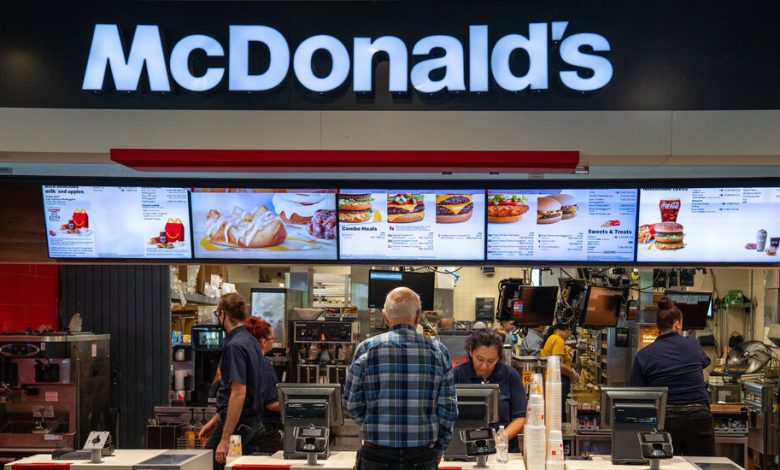Must We Gentrify the Rest Stop?

Five years ago, the New York State Thruway Authority conducted a survey of more than 2,600 drivers to take measure of the customer experience at the service areas lining the 570 miles of road that make up one of the largest toll highways in the country, stretching from the edge of the Bronx up past Buffalo. Whether participants were traveling for work or for pleasure, they had needs that apparently were going unfulfilled.
Among those who identified as occasional users of the Thruway, more than half said they would like food halls with “local artisan” offerings. Some commuters wanted Blue Apron meal kits. The resulting report listed as chief takeaways that leisure travelers complained about unappealing interiors and the lack of “Instagrammable moments.”
In a society so casually stratified that major airlines now offer five classes of service and airport security lines can be bypassed for an annual fee, rest stops remain one of the few spaces in modern life that can be generally counted on to level us. Whether you’ve arrived in an eighteen-wheeler or a Porsche S.U.V. or a 16-year-old Toyota beater, whether you are a devoted consumer of high fats or an otherwise restricted eater of lean proteins and whole grains, you will park, pass through a comfortingly dull stretch of hardscape and order the McDonald’s fries either by way of habit or self-gifted nutritional loophole.
That particular indulgence, though, is no longer available on the New York State Thruway. As of New Year’s Day, all outposts of McDonald’s were closed, the company’s contracts having expired on Dec. 31, 2022. The disappearance of the chain is part of a grand plan of “modernization,” in the words of a spokeswoman for the state authority, which began more or less with cashless tolling and is currently taking hold in the reimagining of the Thruway’s 27 service areas in line with the desires of a blonde-wood-admiring and flaxseed-positive traveling public.
Two years ago, following a bidding process, the job of operating the service areas went to an Irish company called Applegreen, a conglomerate of gas stations and convenience stores backed by the investment giant Blackstone. Applegreen and its partners will pick up the entire cost of the redevelopment ($450 million), leaving public money untouched and delivering what renderings suggest will be the rest stop conceived as a WeWork conceived as a modern weekend place in the farmhouse style. Some spots might have business areas, and the selfie magic might begin in front of floor-to-ceiling windows under an inscription that reads: “Eat Local. Drink Local.”
The Thruway’s service areas were originally built in the mid-1950s and brought the equalizing experience of cafeteria food to a world that was much more egalitarian. Howard Johnson’s arrived in the 1980s. McDonald’s entered the frame a decade later, the last time the stops were remodeled. The current reinvention will bring local farm stands, food trucks and, among some other fast food selections, the polarizing choices of Chick-fil-A, run by a red-state billionaire contributor to anti-LGBTQ causes, and Shake Shack, founded by a liberal billionaire restaurateur who came to prominence serving expensive food around Union Square.
Certainly, there are many reasons to consider it great progress never again to be led into temptation by the golden arches on this stretch of roadway, reminded of the scourge of low-wage work, environmental damage and the aggressive undermining of public health. But on the countervailing side, where we might find some modicum of social good, McDonald’s provides a business model that does not market identity. You don’t get to pretend that you are chic, or rich, urbane or pious when you order a Double Quarter Pounder With Cheese. You are not buying into a philosophy or a lifestyle; you are buying 740 calories of distraction from life.
For many of its democratizing influences, social media has demanded the imposition of bourgeois aesthetic values all across retail culture, no matter how alienating they might be to those who don’t live in a world of plant-based foods and felt-upholstered furniture and who have neither the time nor inclination to record their consumer transactions on camera. The newly transformed La Guardia Airport plays to the iPhone and the compulsion for rarefied space, with an almost perversely cosmopolitan restaurant scene.
On internet chat boards, however, drivers are already registering their frustration with the Thruway changes. Given the deep and longstanding tensions between central New Yorkers and those living downstate, it is not obvious that the people of Utica, for example, would be delighted by the Manhattanization of the highway, over merely maintaining functional generic space that allows them to refuel, grab a sandwich and move along, a dozen potential Instagrammable moments be damned.
